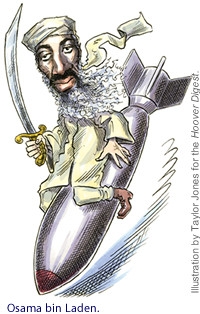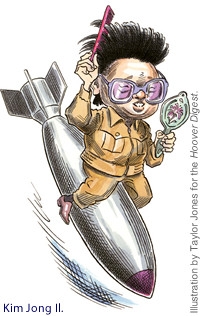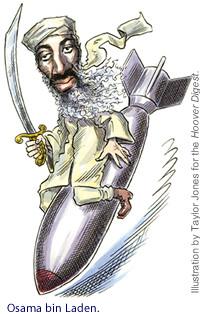- International Affairs
- US Foreign Policy
- Security & Defense
- Terrorism

Last year CIA director George Tenet cautioned the U.S. Senate that we are seeing “the continuing weakening of the international nonproliferation consensus” and that “the domino theory of the twenty-first century may well be nuclear.” Let’s hope he will be proved wrong. Iraq was a dry well as far as existing nuclear weapons are concerned, but the danger of their proliferation is very real, as is evident in North Korea and Iran. Nuclear bombs are not just one more weapon. With an energy release a million times larger than that of previous explosives, mass destruction is inevitable. These weapons pose an existential issue: Can civilization survive? Ronald Reagan, who understood this, often said, “A nuclear war cannot be won and must never be fought.”
This prospect of the spread of nuclear weapons and other dangerous technologies to the hands of suicidal terrorists and rogue nations unrestrained by the norms of civilized behavior has led George W. Bush to remark that “the gravest danger our nation faces lies at the crossroads of radicalism and technology.”
The nuclear restraint regime constructed by the nuclear superpowers during the Cold War is not necessarily going to be replicated. A worst-case scenario can easily be imagined:
• The era of managed nuclear weapons competition, essentially by two nations, is over, and, with it, the stability fostered by a long period of nonproliferation will break down.
• This will generate increased pressures on many countries in unstable regions to make biological weapons to offset the growing nuclear capabilities around them.
• Transnational terrorist organizations will have an easier time gaining access to nuclear weapons, by theft or by deliberate transfer of the weapons.
• This cascade of easily foreseeable events will lead, sooner or later, to the use of nuclear weapons in combat by nation-states or to attacks on major population centers, including American cities, by terrorists equipped with nuclear weapons.
The United States will have to work with all the inspiration and determination it can muster to meet new threats to the proliferation regime and prevent such a scenario from occurring.

Since 1945, restraint in nuclear affairs has played an important role in preventing the use of nuclear weapons in war. Leaders recognized that their only rational purpose was for deterrence, to be used as weapons of defensive last resort. This has helped limit the number of nuclear weapon states to eight. However, prospects for maintaining and strengthening the nonproliferation regime would inevitably be dashed if the United States, with the most powerful military forces in the world, were now to conclude that it has no choice but to develop new nuclear weapons for use in limited military engagements. Regrettably, mixed signals from Washington have raised the prospect that this is a new requirement for our national security. Such an action, by broadening the missions and lowering the threshold for nuclear use, would invite other countries to conclude that they too need nuclear weapons for their security purposes.
Military force—whether applied for preemption against an imminent attack or for prevention to forestall a developing potential attack—is not likely to be the key to solving the general problem of nuclear proliferation, although it will play an indispensable backup role. Obviously, factors quite apart from worries about nuclear proliferation reinforced the determination of President Bush to wage war against Iraq.
Fortunately, there are other actions available to the United States in cases where military force is not the right answer. In fact, strong-willed diplomacy, backed by all the instruments of national power, is generally going to be the right response. Important tools of diplomacy include
• Strengthening the Nuclear Nonproliferation Treaty by expanding the authority of the International Atomic Energy Agency (IAEA) for inspection of suspicious activities
• Continuing the moratorium on underground nuclear explosive testing and working toward bringing a Comprehensive Test Ban Treaty into force
• Pursuing multilateral cooperation on bringing early-warning and defensive systems into force that can help build a stronger anti-proliferation coalition
The most direct way for terrorists to acquire a usable nuclear weapons capability would be through theft or illegal purchase, and the danger is real. The best means of denying a nuclear capability to terrorists is to provide maximum protection for existing stockpiles of weapons and nuclear materials and to reduce their size. This calls for the geographic extension and aggressive application of effective cooperative threat reduction measures, first developed in the 1990s under the Nunn-Lugar legislation for the former Soviet Union, plus an expedited implementation of the nuclear force reductions negotiated by Presidents Bush and Putin in Moscow in 2002.
Potential proliferants are motivated to acquire nuclear weapons primarily by fear of aggressive neighbors and by a desire to enhance their status. We must target our policies to deal with these concerns, rather than viewing each proliferant simply as a nuisance at best and a dangerous enemy at worst. A targeted diplomatic approach, including cooperation as well as confrontation, would offer the option of actually trying to respond to the specific motivations of potential proliferants.
The United States, therefore, must address issues of regional security and prestige in a cooperative, as well as coercive, way. Developing the habits of cooperation can begin with modest confidence-building measures, but the ultimate goal should be clear: to roll back nuclear proliferation, not just to improve international relationships. The priority assigned to achieving this goal must match the gravity of the danger presented by the spread of nuclear weapons capabilities. This has not always been the case, due to conflicting policy requirements.
Is it possible for the United States and its friends to agree on criteria compelling action against terrorists who are attempting to acquire nuclear capabilities or against the states that are harboring them? The experience at the United Nations leading up to the invasion of Iraq shows how difficult that challenge will be. But there is a need to restore and strengthen the international consensus that nuclear proliferation should be prevented, and it must begin with building a consensus within the U.N. Security Council on what to do about terrorists and their access to nuclear weapons.
The International Atomic Energy Agency is the monitoring agency for the Nonproliferation Treaty. It needs to be given more support, including a requirement that tougher monitoring arrangements (“the Additional Protocol”) be a prerequisite for nuclear-related assistance. Enforcement of the Nonproliferation Treaty is a task for the U.N. Security Council, and it must become a higher priority for the council’s five permanent members. A closer, more routine connection between the IAEA and the U.N. Security Council is needed; the United States should take the lead in this.
Plutonium reprocessing and uranium enrichment plants (the front-end of the nuclear fuel cycle) in the possession of non–nuclear weapons states should be discouraged. These plants provide states with the capacity to develop nuclear weapons rapidly. They tend to destabilize the entire nuclear restraint regime. Guaranteed assurances of uninterrupted nuclear fuel supplies from multiple sources will be a necessary part of such a policy. A Security Council resolution setting forth guidelines for acceptable behavior, applying to all U.N. member states, should be adopted as a means of reinforcing the Nonproliferation Treaty.
One reason that the United States is not enjoying the broad international support it should have for the campaign against the linked problems of terrorism and proliferation of nuclear weapons is the perception that unilateral preventive war has become the dominant strain in American thinking about the problem. The administration can and should change that perception by emphasizing that a continuum of means—keyed on patient, determined diplomacy supported by coercion and force when required—must be used to deal with the threats posed by such weapons against the security of the United States and its allies.
A high degree of international consensus and a cooperative nuclear restraint regime are the essential foundations for a successful U.S. anti-proliferation program. This provides the basis for establishing standards of expected behavior and a well-understood cause around which like-minded nations can rally. This is the first line of defense against nuclear terrorism.
















